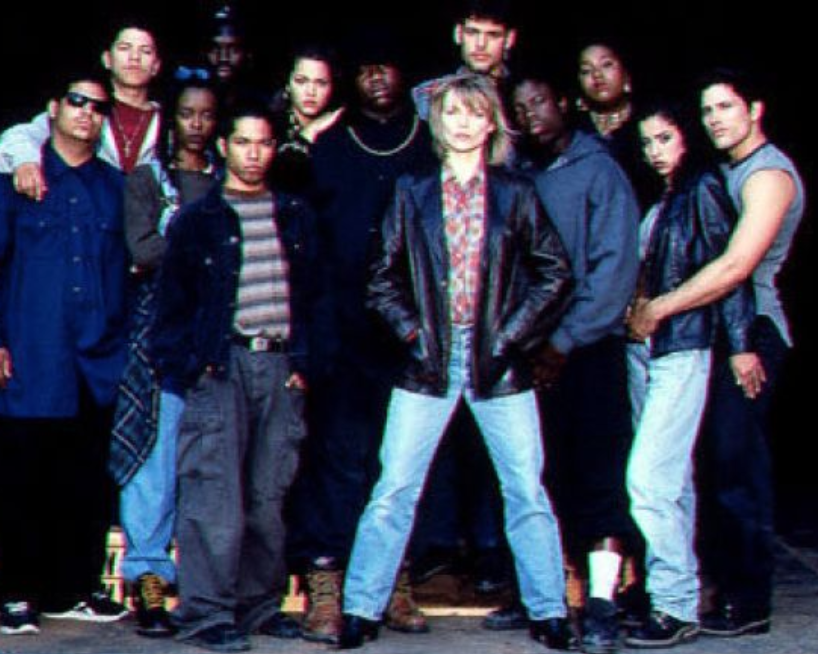From the moment LouAnne Johnson (Michelle Pfeiffer) walks into the classroom of Parkmont High, she is branded as “white bread” by the students she’s been enlisted to teach. The students who have to be bussed from East Palo Alto to attend said school, only to sit lackadaisically and uncaringly as the hour passes and they can go back to their “natural environment.” No stranger to being “enlisted”–for LouAnne is a former U.S. Marine–she is initially jarred by the task at hand, sent blindly into the frying pan without questioning why she was hired so easily for the position. It isn’t until the next day that she tries to change tack, showing up this time in a leather jacket and jeans–for this is, evidently, the uniform of “edge” in the Bay Area. Her sudden change in appearance is met with accusations of being a cowboy, after which she writes on the board that she’s a former Marine and does anyone know karate? This gets their attention. As though her assertion of physical prowess is the only thing that can earn their respect.
But when she tries to teach them some simple verb conjugation, they lose interest in her again, forcing her, once more, to get creative… with the sentence, “We want to die.” An overt allusion to their scholastic laziness being the very thing that will lead them back to the streets. They’re intrigued again, spitting back at her that they don’t want to die, they want her to die. And all her white savior kind. Everything she represents–waltzing in there assuming she can deign to relate to what they’re going through.
Maybe it wouldn’t have been so easy for them to fall for LouAnne’s charms in the end had she been played by Bette Midler, as the real LouAnne Johnson had originally requested. But considering the film was produced by Jerry Bruckheimer (and Don Simpson, whose last movie it would be after an inevitable drug overdose), the need for a “hot” star went without saying. How else would frequent references to her looks instead of her teaching ability be made? Not just by her friend and co-worker, Hal (George Dzundza), an overweight smoker who has known her since she met and divorced her abusive husband, but also her students, including leader of the pack Emilio (Wade Dominguez), who comments of the last teacher that left when the other students shout that he ate her, “That bitch was too ugly to eat. But I’ll eat you.” Rife with lasciviousness, LouAnne tries to act unbristled and writes his name on the board as some sort of inane attempt at embarrassment.
Hearing the sound of the class’ ribald screams from next door in his own “well-mannered” classroom, Hal shrugs,“You know how they are.” They. As in brown and black folks who don’t know how to keep quiet. The comment is off-handed, unintentional in its implications, but that’s what makes it stand out as so inherently racist. Indeed, the racism flies from all sides in this movie, which in many respects, is what makes it such a quintessential example of a white savior film. For first LouAnne must go through her requisite hazing to prove she’s “tough enough” to be taken seriously by the students. Ultimately, they fall right into her trap by allowing her to teach them the ultimate in white savior mumbo jumbo: Bob Dylan. His “poetry” suggested to her as something that might resonate with “the kids” by Hal (of course, LouAnne, in all of her white breadness, at first assumes he’s talking about Dylan Thomas). So it is that the class begins to read incongruously from the lyrics to “Mr. Tambourine Man,” which she tries to make “legit” to them by inferring Mr. Tambourine Man is a code name for a drug dealer. That’s cool, right? Relating to teens from presumably gang banger neighborhoods with talk of drugs.
The real LouAnne also stated she never taught either of the Dylans, but did use rap lyrics in her teachings. Guess that was too non-white for the likes of Bruckheimer and Simpson, wanting to cater to a “wider” (read: whiter) audience with these specific details of the story contributing to buying into how a Caucasian might inspire poverty-stricken, misguided youth. Yet, for all of its problems, Dangerous Minds is a good movie (thanks to screenwriter titan Ronald Bass, of Sleeping With the Enemy, Stepmom and My Best Friend’s Wedding fame–yes, he’s inextricably linked to another white bread queen, Julia Roberts). Cheesy, yes–of the sort of level that only the 90s could get away with. Oversimplifying, absolutely–of the level that only a mainstream Hollywood film addressing this subject matter could be. In fact, this is exactly the type of script that would be used in a screenwriting class (along with Tootsie and As Good As It Gets) to show the precise mechanics of character arcs that will tear at audience heartstrings.
On this note, one could argue that the music video for “Gangsta’s Paradise”–co-starring an even more dolled up Pfeiffer–was grittier than the movie itself. And still, it’s a challenge to watch Dangerous Minds and not get at least slightly verklempt. Naturally, this could easily yield the response, “It’s another classic example of white savior bullshit, only a white person could think this schmaltz was any good. That’s the whole gimmick of the ‘genre.’” Well then why the fuck did Coolio give his blessing to wield “Gangsta’s Paradise” as the song for the soundtrack? Clearly, at the time, the movie had a message that (colorless) 90s minds wanted to impart. Even if Coolio only agreed to it for the lucrative paycheck, knowing full well the song would get a new audience from the white viewers of the film. Proving, one supposes, that even if you have contempt for white bread, every once in a while, it helps to use them for monetary bread. The way they use everyone else “minute after minute, hour after hour.”




















